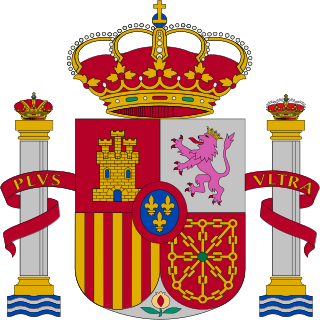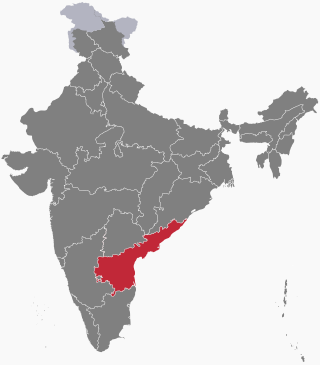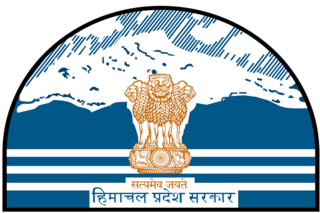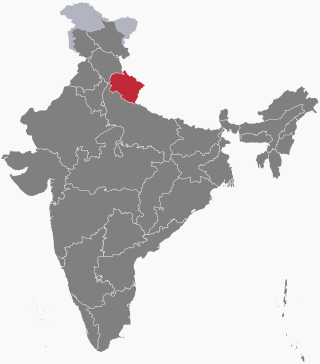A coalition government, or coalition cabinet, is a government by political parties that enter into a power-sharing arrangement of the executive. Coalition governments usually occur when no single party has achieved an absolute majority after an election. A party not having majority is common under proportional representation, but not in nations with majoritarian electoral systems.
Politics of India works within the framework of the country's Constitution. India is a parliamentary secular democratic republic in which the president of India is the head of state & first citizen of India and the Prime Minister of India is the head of government. It is based on the federal structure of government, although the word is not used in the Constitution itself. India follows the dual polity system, i.e. federal in nature, that consists of the central authority at the centre and states at the periphery. The Constitution defines the organizational powers and limitations of both central and state governments; it is well recognised, fluid and considered supreme, i.e. the laws of the nation must conform to it. India is officially declared a secular and socialist state as per the Constitution.

The premier of Queensland is the head of government in the Australian state of Queensland.

The politics of Spain takes place under the framework established by the Constitution of 1978. Spain is established as a social and democratic sovereign country wherein the national sovereignty is vested in the people, from which the powers of the state emanate.
A whip is an official of a political party whose task is to ensure party discipline in a legislature.

The Parliament of the Republic of South Africa is South Africa's legislature. It is located in Cape Town, the country's legislative capital.

The French Parliament is the bicameral parliament of the French Fifth Republic, consisting of the upper house, the Senate, and the lower house, the National Assembly. Each assembly conducts legislative sessions at separate locations in Paris: the Senate meets in the Palais du Luxembourg, the National Assembly convenes at the Palais Bourbon, both on the Rive Gauche.
The State Legislative Assembly, or Vidhana Sabha, or Saasana Sabha, is a legislative body in each of the states and certain union territories of India. In 28 states and 8 union territories, there is a unicameral legislature which is the sole legislative body. In 6 states, the legislative assembly is the lower house of their bicameral legislature with the upper house being the State Legislative Council. 5 union territories are governed directly by the Union Government of India and have no legislative body.
A member of the Legislative Assembly (MLA) is a representative elected by the voters of an electoral district (constituency) to the legislature of State government in the Indian system of government. From each constituency, the people elect one representative who then becomes a member of the Legislative Assembly (MLA). Each state has between seven and nine MLAs for every Member of Parliament (MP) that it has in the Lok Sabha, the lower house of India's bicameral parliament. There are also members in three unicameral legislatures in Union Territories: the Delhi Legislative Assembly, Jammu and Kashmir Legislative Assembly and the Puducherry Legislative Assembly. Only a Member of the Legislative Assembly can work as a minister for more than 6 months. If a non-Member of the Legislative Assembly becomes a Chief Minister or a minister, he must become an MLA within 6 months to continue in the job. Only a Member of the Legislative Assembly can become the Speaker of the Legislature.

Elections in Kerala are regularly held to appoint government officials at various levels, both within the state of Kerala and in India as a whole. These elections encompass national elections as well as regional elections for local bodies and panchayats.

The Parliament of Ghana is the unicameral legislature of Ghana. It consists of 275 members, who are elected for four-year terms in single-seat constituencies using a first-past-the-post voting system.
A parliamentary leader is a political title or a descriptive term used in various countries to designate the person leading a parliamentary group or caucus in a legislative body, whether it be a national or sub-national legislature. They are their party's most senior member of parliament (MP) in most parliamentary democracies.
A legislative session is the period of time in which a legislature, in both parliamentary and presidential systems, is convened for purpose of lawmaking, usually being one of two or more smaller divisions of the entire time between two elections. A session may last for the full term of the legislature or the term may consist of a number of sessions. These may be of fixed duration, such as a year, or may be determined by the party in power. In some countries, a session of the legislature is brought to an end by an official act of prorogation, in others by a motion to adjourn sine die. In either event, the close of a session generally brings an end to all unpassed bills in the legislature, which would have to be introduced anew to continue debate in the following session.

The Government of Kerala, also known as the Kerala Government, is the administrative body responsible for governing the Indian state of Kerala. The government is led by a chief minister, who selects all the other ministers. The chief minister and their most senior ministers belong to the supreme decision-making committee, known as the cabinet.
The politics of Odisha are part of India's federal parliamentary representative democracy, where the union government exercises sovereign rights. Certain powers are reserved to the states, including Odisha. The state has a multi-party system, in which the two main parties are the nationalist Bharatiya Janata Party (BJP) and the regional, socialist Biju Janata Dal (BJD). The Indian National Congress (INC) has also significant presence.

Elections in Andhra Pradesh are conducted in accordance with the Constitution of India. The Assembly of Andhra Pradesh creates laws regarding the conduct of local body elections unilaterally while any changes by the state legislature to the conduct of state level elections need to be approved by the Parliament of India. In addition, the state legislature may be dismissed by the Parliament according to Article 356 of the Indian Constitution and President's rule may be imposed.

The Himachal Pradesh Legislative Assembly is the unicameral legislature of the Indian state of Himachal Pradesh. The seat of the Assembly is at Shimla, the capital of the state. There are 68 Members of Legislative Assembly, all directly elected from single-seat constituencies. Its term is 5 years, unless sooner dissolved.

Elections in the state of Bihar, India are conducted in accordance with the Constitution of India. The Assembly of Bihar creates laws regarding the conduct of local body elections unilaterally while any changes by the state legislature to the conduct of state level elections need to be approved by the Parliament of India.

Elections for the Uttarakhand Legislative Assembly in Uttarakhand state, India are conducted in accordance with the Constitution of India. The legislative assembly of Uttarakhand creates laws regarding the conduct of local body elections unilaterally while any changes by the state legislature to the conduct of state level elections need to be approved by the Parliament of India. In addition, the state legislature may be dismissed by the Parliament according to Article 356 of the Indian Constitution and President's rule may be imposed.
Elections in the Republic of India in 2018 included by-elections to the Lok Sabha, elections to the Rajya Sabha, elections to of eight states and numerous other by-elections to state legislative assemblies, councils and local bodies.










